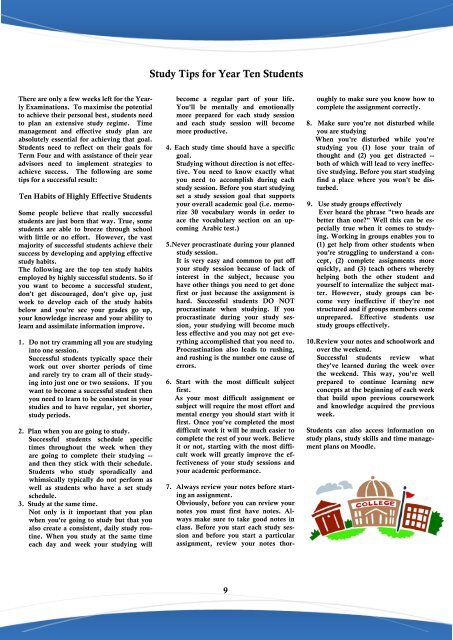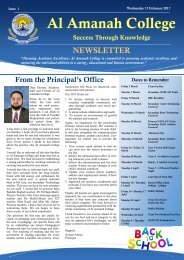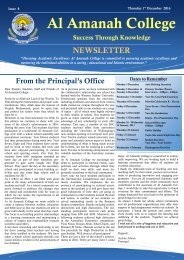Al Amanah College
14lQMdDNR
14lQMdDNR
Create successful ePaper yourself
Turn your PDF publications into a flip-book with our unique Google optimized e-Paper software.
<strong>Al</strong> <strong>Amanah</strong> <strong>College</strong><br />
Newsletter 2013<br />
Study Tips for Year Ten Students<br />
There are only a few weeks left for the Yearly<br />
Examinations. To maximise the potential<br />
to achieve their personal best, students need<br />
to plan an extensive study regime. Time<br />
management and effective study plan are<br />
absolutely essential for achieving that goal.<br />
Students need to reflect on their goals for<br />
Term Four and with assistance of their year<br />
advisors need to implement strategies to<br />
achieve success. The following are some<br />
tips for a successful result:<br />
Ten Habits of Highly Effective Students<br />
Some people believe that really successful<br />
students are just born that way. True, some<br />
students are able to breeze through school<br />
with little or no effort. However, the vast<br />
majority of successful students achieve their<br />
success by developing and applying effective<br />
study habits.<br />
The following are the top ten study habits<br />
employed by highly successful students. So if<br />
you want to become a successful student,<br />
don't get discouraged, don't give up, just<br />
work to develop each of the study habits<br />
below and you're see your grades go up,<br />
your knowledge increase and your ability to<br />
learn and assimilate information improve.<br />
1. Do not try cramming all you are studying<br />
into one session.<br />
Successful students typically space their<br />
work out over shorter periods of time<br />
and rarely try to cram all of their studying<br />
into just one or two sessions. If you<br />
want to become a successful student then<br />
you need to learn to be consistent in your<br />
studies and to have regular, yet shorter,<br />
study periods.<br />
2. Plan when you are going to study.<br />
Successful students schedule specific<br />
times throughout the week when they<br />
are going to complete their studying --<br />
and then they stick with their schedule.<br />
Students who study sporadically and<br />
whimsically typically do not perform as<br />
well as students who have a set study<br />
schedule.<br />
3. Study at the same time.<br />
Not only is it important that you plan<br />
when you're going to study but that you<br />
also create a consistent, daily study routine.<br />
When you study at the same time<br />
each day and week your studying will<br />
become a regular part of your life.<br />
You'll be mentally and emotionally<br />
more prepared for each study session<br />
and each study session will become<br />
more productive.<br />
4. Each study time should have a specific<br />
goal.<br />
Studying without direction is not effective.<br />
You need to know exactly what<br />
you need to accomplish during each<br />
study session. Before you start studying<br />
set a study session goal that supports<br />
your overall academic goal (i.e. memorize<br />
30 vocabulary words in order to<br />
ace the vocabulary section on an upcoming<br />
Arabic test.)<br />
5.Never procrastinate during your planned<br />
study session.<br />
It is very easy and common to put off<br />
your study session because of lack of<br />
interest in the subject, because you<br />
have other things you need to get done<br />
first or just because the assignment is<br />
hard. Successful students DO NOT<br />
procrastinate when studying. If you<br />
procrastinate during your study session,<br />
your studying will become much<br />
less effective and you may not get everything<br />
accomplished that you need to.<br />
Procrastination also leads to rushing,<br />
and rushing is the number one cause of<br />
errors.<br />
6. Start with the most difficult subject<br />
first.<br />
As your most difficult assignment or<br />
subject will require the most effort and<br />
mental energy you should start with it<br />
first. Once you've completed the most<br />
difficult work it will be much easier to<br />
complete the rest of your work. Believe<br />
it or not, starting with the most difficult<br />
work will greatly improve the effectiveness<br />
of your study sessions and<br />
your academic performance.<br />
7. <strong>Al</strong>ways review your notes before starting<br />
an assignment.<br />
Obviously, before you can review your<br />
notes you must first have notes. <strong>Al</strong>ways<br />
make sure to take good notes in<br />
class. Before you start each study session<br />
and before you start a particular<br />
assignment, review your notes thoroughly<br />
to make sure you know how to<br />
complete the assignment correctly.<br />
8. Make sure you're not disturbed while<br />
you are studying<br />
When you're disturbed while you're<br />
studying you (1) lose your train of<br />
thought and (2) you get distracted --<br />
both of which will lead to very ineffective<br />
studying. Before you start studying<br />
find a place where you won't be disturbed.<br />
9. Use study groups effectively<br />
Ever heard the phrase "two heads are<br />
better than one?" Well this can be especially<br />
true when it comes to studying.<br />
Working in groups enables you to<br />
(1) get help from other students when<br />
you're struggling to understand a concept,<br />
(2) complete assignments more<br />
quickly, and (3) teach others whereby<br />
helping both the other student and<br />
yourself to internalize the subject matter.<br />
However, study groups can become<br />
very ineffective if they're not<br />
structured and if groups members come<br />
unprepared. Effective students use<br />
study groups effectively.<br />
10.Review your notes and schoolwork and<br />
over the weekend.<br />
Successful students review what<br />
they've learned during the week over<br />
the weekend. This way, you’re well<br />
prepared to continue learning new<br />
concepts at the beginning of each week<br />
that build upon previous coursework<br />
and knowledge acquired the previous<br />
week.<br />
Students can also access information on<br />
study plans, study skills and time management<br />
plans on Moodle.<br />
9








